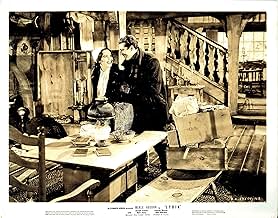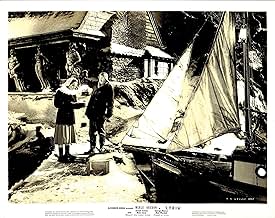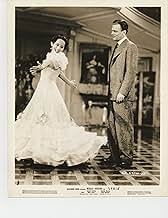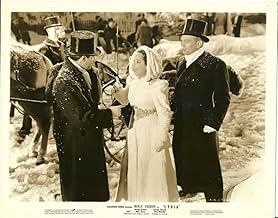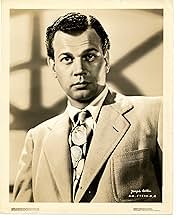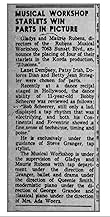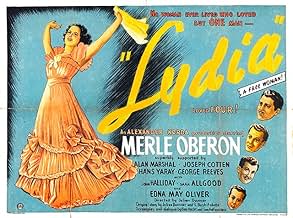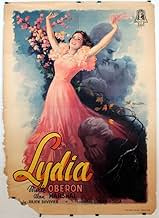Agrega una trama en tu idiomaAn elderly woman reunites with the three men who loved her in their youth.An elderly woman reunites with the three men who loved her in their youth.An elderly woman reunites with the three men who loved her in their youth.
- Dirección
- Guionistas
- Elenco
- Nominado a 1 premio Óscar
- 5 premios ganados y 1 nominación en total
Hans Jaray
- Frank
- (as Hans Yaray)
Evelyn Beresford
- Sarah's Guest
- (sin créditos)
Tyler Brooke
- Vaudeville Singer
- (sin créditos)
Frank Conlan
- Old Ned
- (sin créditos)
Harry Cording
- Hotel House Detective
- (sin créditos)
Hal K. Dawson
- Hotel Desk Clerk
- (sin créditos)
Jack Deery
- Ball Guest
- (sin créditos)
Paul Everton
- Sarah's Guest
- (sin créditos)
Jesse Graves
- Michael's Servant
- (sin créditos)
Bobbie Hale
- Bar Patron
- (sin créditos)
Gertrude Hoffman
- Mrs. Fairfield
- (sin créditos)
Opiniones destacadas
After dedicating a home for blind and crippled children, doddering old Merle Oberon (as Lydia MacMillan), who never married, attends a surprise gathering of her old boyfriends. The reunion is arranged by physician Joseph Cotten (as Michael Fitzpatrick). The son of Ms. Oberon's family butler, Mr. Cotten has also invited blind musician Hans Jaray (as Frank Andre) and future "Superman" George Reeves (as Bill Willard). A fourth beau, seafaring adventurer Alan Marshal (as Richard Mason) may or may not appear. He is one of the story's mysteries, so stay tuned. Oberon and her old suitors reminisce about their romances, in flashbacks beginning in 1897, when "the prettiest girl in Boston" was a desirable young maiden...
"Lydia" is a re-make of director Julien Duvivier's "Un carnet de bal" (1937), re-fashioned entirely for star Merle Oberon by producer Alexander Korda. The original French export was a worldwide hit, with Mr. Duvivier and his remarkable original players receiving much critical acclaim. There are some significant changes in the story, but they do improve the central played by Mrs. Korda (Oberon). She is the reason for the picture, clearly. An impressive group was hired for this motion picture; their skills are intermittently evident, but the totality of the film is far too pretentious...
Watch "Lydia" for the production values and moments of perfection. You'll find much of the latter in the work of supporting actress Edna May Oliver (as Sarah "Granny" MacMillan). This was the last appearance of Ms. Oliver, a classic character actress who became the most valuable player nearly every time she appeared on screen. Oliver's character appears in the flashbacks, as Oberon's wealthy and outspoken grandmother. She complains about mysterious internal ailments, but is considered a hypochondriac. The veteran actress died in 1942, of internal ailments. In real life, Oliver passed away peacefully in her sleep. On screen, she plays her expiration scene with Shakespearian majesty. This is how it should be done.
****** Lydia (9/18/41) Julien Duvivier ~ Merle Oberon, Joseph Cotten, Edna May Oliver, Alan Marshal
"Lydia" is a re-make of director Julien Duvivier's "Un carnet de bal" (1937), re-fashioned entirely for star Merle Oberon by producer Alexander Korda. The original French export was a worldwide hit, with Mr. Duvivier and his remarkable original players receiving much critical acclaim. There are some significant changes in the story, but they do improve the central played by Mrs. Korda (Oberon). She is the reason for the picture, clearly. An impressive group was hired for this motion picture; their skills are intermittently evident, but the totality of the film is far too pretentious...
Watch "Lydia" for the production values and moments of perfection. You'll find much of the latter in the work of supporting actress Edna May Oliver (as Sarah "Granny" MacMillan). This was the last appearance of Ms. Oliver, a classic character actress who became the most valuable player nearly every time she appeared on screen. Oliver's character appears in the flashbacks, as Oberon's wealthy and outspoken grandmother. She complains about mysterious internal ailments, but is considered a hypochondriac. The veteran actress died in 1942, of internal ailments. In real life, Oliver passed away peacefully in her sleep. On screen, she plays her expiration scene with Shakespearian majesty. This is how it should be done.
****** Lydia (9/18/41) Julien Duvivier ~ Merle Oberon, Joseph Cotten, Edna May Oliver, Alan Marshal
Here Oberon shines. The story is slight, yet gives Oberon time to revel in the Ben Hecht/Samuel Hoffenstein dialogue. Oberon plays Lydia, a woman who is searching for love. The film is framed by a reunion, with Lydia as an old woman. She is reunited with the four fellows that have chased her throughout her life. All four actors do their best with their roles, but none standout. They mostly just stare longingly at Oberon for the duration of the film. None are given much consideration or motivation other than as a lovers for Oberon can push around.
Other than Oberon, Julien Duvivier, the director, is the real star. His direction makes the most out of the simple plot. Certain scenes stick out more than others. The scene when Michael (Joseph Cotten) and Lydia run into the ball of Lydia's imagination, in slow-motion is very memorable for its dream-like feel. Also, when Frank (Hans Jaray), the blind pianist plays for the blind children, the scene is framed very beautifully. Also Miklos Rozsa's Oscar-nominated score is very good.
A pretty good drama that suffers from a necessary but clumsy framing device with the reunion, as well as a third act that doesn't jell well with the rest of the film.
Other than Oberon, Julien Duvivier, the director, is the real star. His direction makes the most out of the simple plot. Certain scenes stick out more than others. The scene when Michael (Joseph Cotten) and Lydia run into the ball of Lydia's imagination, in slow-motion is very memorable for its dream-like feel. Also, when Frank (Hans Jaray), the blind pianist plays for the blind children, the scene is framed very beautifully. Also Miklos Rozsa's Oscar-nominated score is very good.
A pretty good drama that suffers from a necessary but clumsy framing device with the reunion, as well as a third act that doesn't jell well with the rest of the film.
"Lydia" from 1941 is a remake of Jacques Duvivier's 1937 'Un Carnet De Bal.' It retains the same plot and here is remade by Duvivier himself.
Lydia MacMillan (Merle Oberon) is an old but still vital single woman who is visited by four ex-suitors: Michael (Joseph Cotton), Hans (Frank Andre), and Bob (George Reeves) who reminisce with her about the old days and how much they all loved her and wanted to marry her, and how, one way or another, it just didn't work out.
It turns out that Lydia, from a good Boston family, only had one great love, Richard (Alan Marshal), who, after a few days together (during which I think we are to assume she lost her virginity) takes off in his boat. He leaves her a "Dear Jane" letter, stating that he'll be back after he clears things up with a woman who "has a claim on him." He gives her his grandmother's wedding ring and says he will keep sending her rings until he returns. She hears from him sporadically but she never sees him again.
She can really never let go of her love for him, so she remains single, and devotes herself to her work with blind children, who attend a school she set up.
In 'Un Carnet de Bal," the character is widowed and wonders how her life would have been had she married the other men who were in love with her, the men who danced with her one night that changed her life forever.
The angle of "Lydia" is a little different and probably a little deeper. But it's still a film about nostalgia, youth, and disenchantment.
Edna Mae Oliver plays Lydia's grandmother, and she's wonderful in this, her last film. She died the following year at the age of 59. People probably thought she was 75.
Merle Oberon gives a lovely performance as Lydia, both as a young woman reveling in her beautiful gown, dancing, and being young, and as an older woman reminiscing. She tells each of the men that none of her really loved her because they never knew her; Michael loved "an angel," Hans, the blind composer/pianist she meets loved "the blond, blue eyed girl" described to him by a child whom he asked to describe Lydia and instead, she describes her doll; and Bob loved the young, wild thing that was ready to elope with him. Richard was the only man who truly knew her, and with him, she was herself. Or so she believes.
Duvivier did the best he could with this Americanized version, but it can't live up to 'Un Carnet De Bal' with its French sensibility.
Nevertheless, pleasant and worth seeing. A bittersweet story of a woman looking back on her life. We all do it at some point.
Lydia MacMillan (Merle Oberon) is an old but still vital single woman who is visited by four ex-suitors: Michael (Joseph Cotton), Hans (Frank Andre), and Bob (George Reeves) who reminisce with her about the old days and how much they all loved her and wanted to marry her, and how, one way or another, it just didn't work out.
It turns out that Lydia, from a good Boston family, only had one great love, Richard (Alan Marshal), who, after a few days together (during which I think we are to assume she lost her virginity) takes off in his boat. He leaves her a "Dear Jane" letter, stating that he'll be back after he clears things up with a woman who "has a claim on him." He gives her his grandmother's wedding ring and says he will keep sending her rings until he returns. She hears from him sporadically but she never sees him again.
She can really never let go of her love for him, so she remains single, and devotes herself to her work with blind children, who attend a school she set up.
In 'Un Carnet de Bal," the character is widowed and wonders how her life would have been had she married the other men who were in love with her, the men who danced with her one night that changed her life forever.
The angle of "Lydia" is a little different and probably a little deeper. But it's still a film about nostalgia, youth, and disenchantment.
Edna Mae Oliver plays Lydia's grandmother, and she's wonderful in this, her last film. She died the following year at the age of 59. People probably thought she was 75.
Merle Oberon gives a lovely performance as Lydia, both as a young woman reveling in her beautiful gown, dancing, and being young, and as an older woman reminiscing. She tells each of the men that none of her really loved her because they never knew her; Michael loved "an angel," Hans, the blind composer/pianist she meets loved "the blond, blue eyed girl" described to him by a child whom he asked to describe Lydia and instead, she describes her doll; and Bob loved the young, wild thing that was ready to elope with him. Richard was the only man who truly knew her, and with him, she was herself. Or so she believes.
Duvivier did the best he could with this Americanized version, but it can't live up to 'Un Carnet De Bal' with its French sensibility.
Nevertheless, pleasant and worth seeing. A bittersweet story of a woman looking back on her life. We all do it at some point.
An unexceptionable pleasure to the primary senses of the eyes and ears. This results from a combination of Oberon's lush eyebrows and the pillowy opulence one imagines from a director with a surname like Duvivier. The film is a 'refashioning' of his French-language 'Un Carnet De Bal' from 1937, in that the basic plot is Oberon's portmanteau recollection of 4 past loves. Cynics may understandably dive for the sick bags, but it's a pleasant surprise therefore to find that for all the typical Fox emphasis on visual scrumptiousness, this romantic opus turns out to be a narratively literate affair. It's lent considerable dramatic weight by an excellent cast, including an uncharacteristically unhistrionic Oberon.
Merle Oberon stars in the title role of Lydia who seems to have all the young gallants of the turn of the last century just champing at the bit. But it's now 1941 and we meet Merle as an old spinster woman who is quite the well known public philanthropist. She never married, but not that didn't have plenty of chances.
Four of her old beaus have gathered at the invitation of one of them Joseph Cotten who was the son of the butler John Halliday in the home where Oberon grew up. Cotten is now a respectable physician and the others he's invited are George Reeves a nightclub owner, Hans Jaray a blind concert pianist, and a sea captain Alan Marshal.
Merle loved them all in her own way, but couldn't quite commit to any of them. All of them saw a different Merle in their salad days.
I'm thinking that the film lost a great deal in translation from the original French movie Dance Program which was also directed by Julian Duvivier. It would almost have to be the case given the far stricter censorship that we had as opposed to the French.
Lydia is entertaining and good enough and the cast performs their roles well. But the film is a bland romantic concoction, I'll bet the original French is much better.
Four of her old beaus have gathered at the invitation of one of them Joseph Cotten who was the son of the butler John Halliday in the home where Oberon grew up. Cotten is now a respectable physician and the others he's invited are George Reeves a nightclub owner, Hans Jaray a blind concert pianist, and a sea captain Alan Marshal.
Merle loved them all in her own way, but couldn't quite commit to any of them. All of them saw a different Merle in their salad days.
I'm thinking that the film lost a great deal in translation from the original French movie Dance Program which was also directed by Julian Duvivier. It would almost have to be the case given the far stricter censorship that we had as opposed to the French.
Lydia is entertaining and good enough and the cast performs their roles well. But the film is a bland romantic concoction, I'll bet the original French is much better.
¿Sabías que…?
- TriviaThe poem Lydia and Bob quote at the ball is "The Night has a Thousand Eyes" by Francis William Bourdillon, a Victorian English poet (1852-1921). The text is "The night has a thousand eyes, / And the day but one; / Yet the light of the bright world dies / With the dying sun. / The mind has a thousand eyes, / And the heart but one: / Yet the light of a whole life dies / When love is done."
- ErroresAt one point, Granny mentions her intention to send Lydia to her cousin Sally's. In the next scene, Lydia refers to her cousin as "Mary".
- ConexionesFeatured in Ladies in Black (2018)
Selecciones populares
Inicia sesión para calificar y agrega a la lista de videos para obtener recomendaciones personalizadas
- How long is Lydia?Con tecnología de Alexa
Detalles
- Tiempo de ejecución1 hora 44 minutos
- Color
- Relación de aspecto
- 1.37 : 1
Contribuir a esta página
Sugiere una edición o agrega el contenido que falta

Principales brechas de datos
By what name was Lydia (1941) officially released in India in English?
Responda
